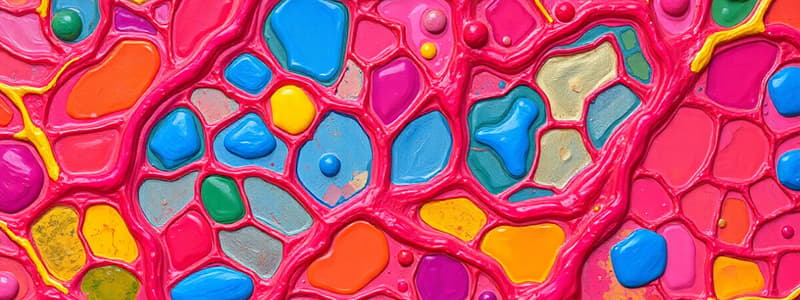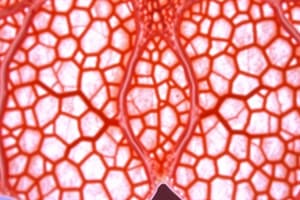Podcast
Questions and Answers
What characterizes fibrocartilage?
What characterizes fibrocartilage?
- Contains densely packed elastic fibers
- Resists compression and supports weight (correct)
- Found primarily in the external ear
- Surrounded by a perichondrium
Which of the following are found in the structure of bone?
Which of the following are found in the structure of bone?
- Fibroblasts
- Chondrocytes
- Lacunae (correct)
- Perichondrium
Which characteristic distinguishes spongy bone from compact bone?
Which characteristic distinguishes spongy bone from compact bone?
- Presence of osteons
- Greater density
- Uniform solid mass
- Latticework structure (correct)
What is the main function of elastic cartilage?
What is the main function of elastic cartilage?
Which connective tissue type is described as having sparse ground substance?
Which connective tissue type is described as having sparse ground substance?
What are the inorganic components of bone primarily composed of?
What are the inorganic components of bone primarily composed of?
Which feature of compact bone is essential for its function?
Which feature of compact bone is essential for its function?
What is a characteristic feature of protein fibers in connective tissues?
What is a characteristic feature of protein fibers in connective tissues?
What is the primary function of white adipose tissue?
What is the primary function of white adipose tissue?
Which type of connective tissue is primarily composed of reticular fibers and fibroblasts?
Which type of connective tissue is primarily composed of reticular fibers and fibroblasts?
In which type of connective tissue would you find tightly packed collagen fibers oriented in the same direction?
In which type of connective tissue would you find tightly packed collagen fibers oriented in the same direction?
What does brown adipose tissue primarily do?
What does brown adipose tissue primarily do?
What component is predominantly found in dense connective tissue?
What component is predominantly found in dense connective tissue?
How do the blood vessel contents differ between dense regular connective tissue and loose connective tissue?
How do the blood vessel contents differ between dense regular connective tissue and loose connective tissue?
Which of the following best describes the structure of dense irregular connective tissue?
Which of the following best describes the structure of dense irregular connective tissue?
Which of the following is NOT a characteristic of adipose connective tissue?
Which of the following is NOT a characteristic of adipose connective tissue?
What is one of the primary functions of connective tissue?
What is one of the primary functions of connective tissue?
Which type of connective tissue is characterized by a loose organization of collagen and elastic fibers?
Which type of connective tissue is characterized by a loose organization of collagen and elastic fibers?
Which type of connective tissue has a primary role in energy storage?
Which type of connective tissue has a primary role in energy storage?
What characteristic differentiates loose connective tissue from dense connective tissue?
What characteristic differentiates loose connective tissue from dense connective tissue?
What is the predominant cell type found in areolar connective tissue?
What is the predominant cell type found in areolar connective tissue?
Which statement about the extracellular matrix of connective tissue is true?
Which statement about the extracellular matrix of connective tissue is true?
What is a common feature of all types of connective tissue?
What is a common feature of all types of connective tissue?
Which type of protein fibers provide elasticity to the connective tissue?
Which type of protein fibers provide elasticity to the connective tissue?
Flashcards are hidden until you start studying
Study Notes
Adipose CT
- Commonly referred to as fat
- Composed primarily of adipocytes
- Includes two types:
- White adipose tissue: stores energy, acts as an insulator, cushions
- Brown adipose tissue: found in newborns, generates heat, is lost as we age
- Adipose gain and loss are due to adipocytes enlarging or shrinking
Reticular CT
- Consists of a network of reticular fibers, fibroblasts, and leukocytes
- Provides structural support (stroma) to many lymphatic organs, including the spleen, thymus, lymph nodes, and bone marrow
Dense CT
- Characterized by a higher density of protein fibers compared to loose connective tissue
- Contains less ground substance than loose connective tissue
- Collagen fibers are the predominant type
- Divided into three categories:
- Dense regular CT
- Dense irregular CT
- Elastic CT
Dense Regular CT
- Features tightly packed, parallel collagen fibers resembling stacked lasagna noodles
- Found in tendons and ligaments, where stress is typically applied in a single direction
- Has few blood vessels, leading to a slow healing process
Fibrocartilage
- A weight-bearing cartilage that resists compression
- Contains protein fibers in irregular bundles between chondrocytes
- Possesses sparse ground substance and lacks a perichondrium
- Found in intervertebral discs, the pubic symphysis, and the menisci of the knee joint
Elastic Cartilage
- This flexible and springy cartilage is characterized by numerous densely packed elastic fibers
- Elastic fibers ensure tissue resilience and flexibility
- Chondrocytes are closely packed and surrounded by a perichondrium
- Located in the external ear and epiglottis.
Bone
- Stronger than cartilage, providing greater support but less flexibility
- Consists of organic components (collagen and glycoproteins) and inorganic components (calcium salts)
- Contains bone cells called osteocytes housed within spaces in the extracellular matrix called lacunae
- Two types:
- Compact bone
- Spongy bone
Compact Bone
- Perforated by neurovascular canals
- Displays cylindrical structures called osteons, with concentric rings of bone connective tissue called lamellae
- Lamellae surround a central canal containing blood vessels and nerves
Spongy Bone
- Located in the interior of the bone
- Has a latticework structure making it strong and lightweight
Functions of Connective Tissue
- Provides physical protection
- Offers support and structural framework
- Binds structures together
- Stores various substances
- Facilitates transport
- Offers immune protection
Loose CT
- Contains fewer cells and protein fibers than dense CT
- Protein fibers are sparse and irregularly arranged
- Possesses abundant ground substance
- Serves as the body's “packing material”, supporting structures
- Includes three types:
- Areolar CT
- Adipose CT
- Reticular CT
Areolar CT
- Characterized by a loose organization of collagen and elastic fibers
- Highly vascularized
- Fibroblasts are the predominant cell type
- Contains abundant and viscous ground substance
- Found in the papillary layer of the dermis, subcutaneous layer, surrounding organs, nerve and muscle cells, and blood vessels
Studying That Suits You
Use AI to generate personalized quizzes and flashcards to suit your learning preferences.




